Effective Management in Sports: Event Planning and Execution
VerifiedAdded on 2023/06/13
|10
|2562
|101
Report
AI Summary
This report provides an overview of event planning and management within a sports context, focusing on the Australian Athletics Federation. It covers key managerial areas such as management behavior competences, employee satisfaction, recruitment and employer branding, psychology and motivation, organizational culture, and teamwork. The report also addresses athlete recruitment, performance management, coach and athlete development, sports sciences, and the daily training environment. Furthermore, it discusses rewarding sports professionals, employment rights and regulations, and the management of volunteers and subcontractors, highlighting the importance of effective management in ensuring optimal performance and growth within sports organizations. Desklib offers a wide range of study resources, including past papers and solved assignments, to support students in their academic endeavors.
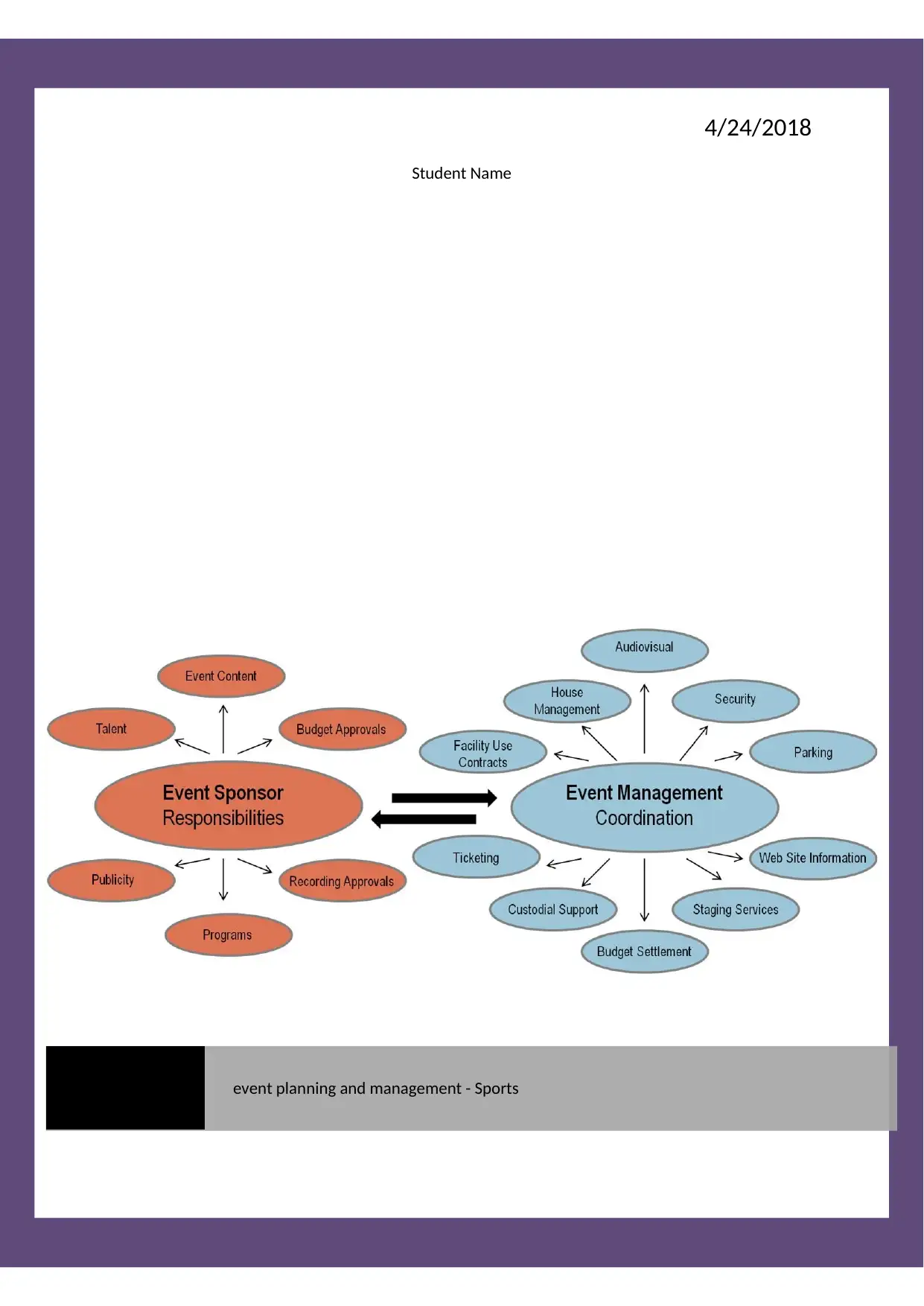
4/24/2018
Student Name
event planning and management - Sports
Student Name
event planning and management - Sports
Paraphrase This Document
Need a fresh take? Get an instant paraphrase of this document with our AI Paraphraser
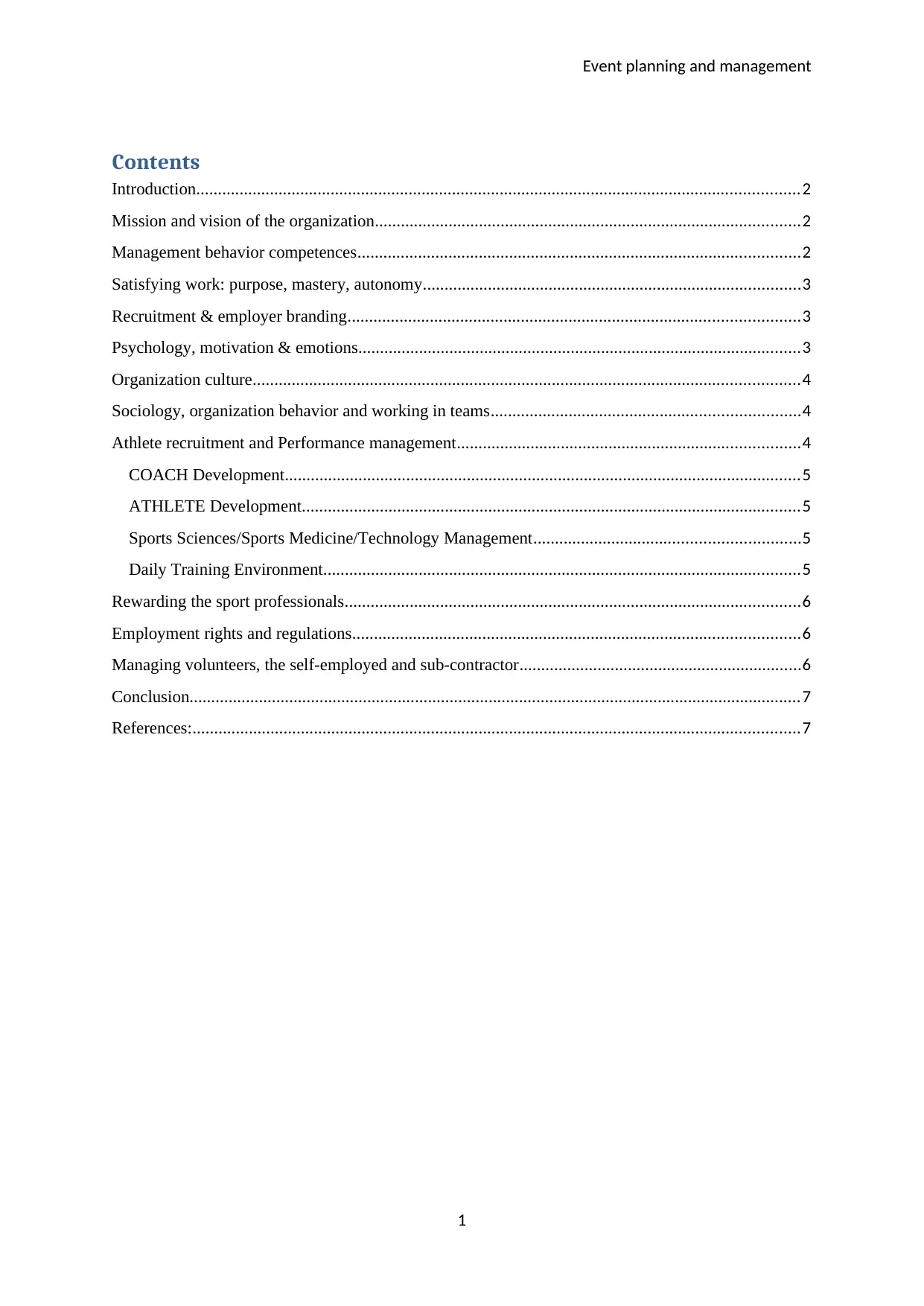
Event planning and management
Contents
Introduction...........................................................................................................................................2
Mission and vision of the organization..................................................................................................2
Management behavior competences......................................................................................................2
Satisfying work: purpose, mastery, autonomy.......................................................................................3
Recruitment & employer branding........................................................................................................3
Psychology, motivation & emotions......................................................................................................3
Organization culture..............................................................................................................................4
Sociology, organization behavior and working in teams.......................................................................4
Athlete recruitment and Performance management...............................................................................4
COACH Development.......................................................................................................................5
ATHLETE Development...................................................................................................................5
Sports Sciences/Sports Medicine/Technology Management.............................................................5
Daily Training Environment..............................................................................................................5
Rewarding the sport professionals.........................................................................................................6
Employment rights and regulations.......................................................................................................6
Managing volunteers, the self-employed and sub-contractor.................................................................6
Conclusion.............................................................................................................................................7
References:............................................................................................................................................7
1
Contents
Introduction...........................................................................................................................................2
Mission and vision of the organization..................................................................................................2
Management behavior competences......................................................................................................2
Satisfying work: purpose, mastery, autonomy.......................................................................................3
Recruitment & employer branding........................................................................................................3
Psychology, motivation & emotions......................................................................................................3
Organization culture..............................................................................................................................4
Sociology, organization behavior and working in teams.......................................................................4
Athlete recruitment and Performance management...............................................................................4
COACH Development.......................................................................................................................5
ATHLETE Development...................................................................................................................5
Sports Sciences/Sports Medicine/Technology Management.............................................................5
Daily Training Environment..............................................................................................................5
Rewarding the sport professionals.........................................................................................................6
Employment rights and regulations.......................................................................................................6
Managing volunteers, the self-employed and sub-contractor.................................................................6
Conclusion.............................................................................................................................................7
References:............................................................................................................................................7
1
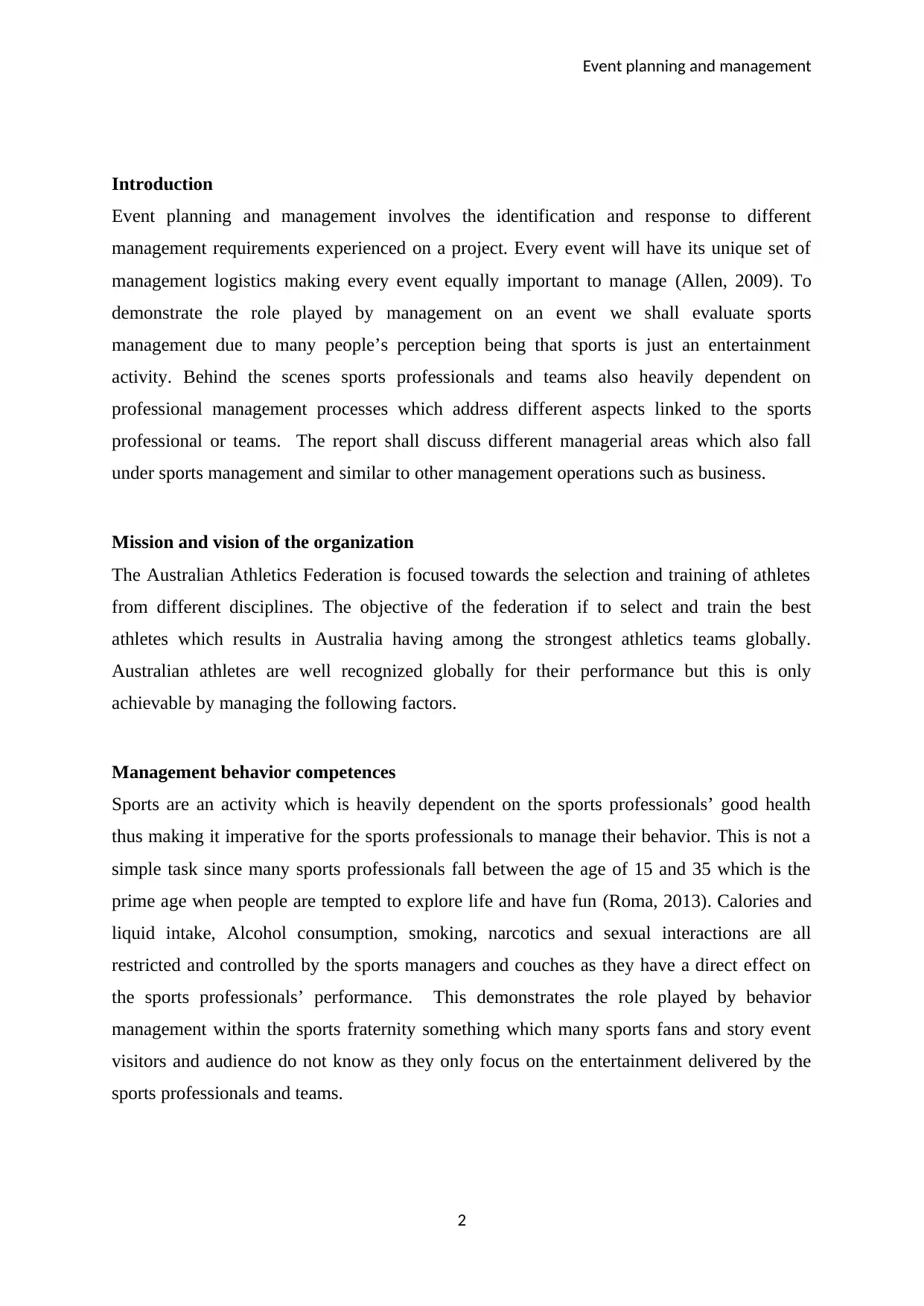
Event planning and management
Introduction
Event planning and management involves the identification and response to different
management requirements experienced on a project. Every event will have its unique set of
management logistics making every event equally important to manage (Allen, 2009). To
demonstrate the role played by management on an event we shall evaluate sports
management due to many people’s perception being that sports is just an entertainment
activity. Behind the scenes sports professionals and teams also heavily dependent on
professional management processes which address different aspects linked to the sports
professional or teams. The report shall discuss different managerial areas which also fall
under sports management and similar to other management operations such as business.
Mission and vision of the organization
The Australian Athletics Federation is focused towards the selection and training of athletes
from different disciplines. The objective of the federation if to select and train the best
athletes which results in Australia having among the strongest athletics teams globally.
Australian athletes are well recognized globally for their performance but this is only
achievable by managing the following factors.
Management behavior competences
Sports are an activity which is heavily dependent on the sports professionals’ good health
thus making it imperative for the sports professionals to manage their behavior. This is not a
simple task since many sports professionals fall between the age of 15 and 35 which is the
prime age when people are tempted to explore life and have fun (Roma, 2013). Calories and
liquid intake, Alcohol consumption, smoking, narcotics and sexual interactions are all
restricted and controlled by the sports managers and couches as they have a direct effect on
the sports professionals’ performance. This demonstrates the role played by behavior
management within the sports fraternity something which many sports fans and story event
visitors and audience do not know as they only focus on the entertainment delivered by the
sports professionals and teams.
2
Introduction
Event planning and management involves the identification and response to different
management requirements experienced on a project. Every event will have its unique set of
management logistics making every event equally important to manage (Allen, 2009). To
demonstrate the role played by management on an event we shall evaluate sports
management due to many people’s perception being that sports is just an entertainment
activity. Behind the scenes sports professionals and teams also heavily dependent on
professional management processes which address different aspects linked to the sports
professional or teams. The report shall discuss different managerial areas which also fall
under sports management and similar to other management operations such as business.
Mission and vision of the organization
The Australian Athletics Federation is focused towards the selection and training of athletes
from different disciplines. The objective of the federation if to select and train the best
athletes which results in Australia having among the strongest athletics teams globally.
Australian athletes are well recognized globally for their performance but this is only
achievable by managing the following factors.
Management behavior competences
Sports are an activity which is heavily dependent on the sports professionals’ good health
thus making it imperative for the sports professionals to manage their behavior. This is not a
simple task since many sports professionals fall between the age of 15 and 35 which is the
prime age when people are tempted to explore life and have fun (Roma, 2013). Calories and
liquid intake, Alcohol consumption, smoking, narcotics and sexual interactions are all
restricted and controlled by the sports managers and couches as they have a direct effect on
the sports professionals’ performance. This demonstrates the role played by behavior
management within the sports fraternity something which many sports fans and story event
visitors and audience do not know as they only focus on the entertainment delivered by the
sports professionals and teams.
2
⊘ This is a preview!⊘
Do you want full access?
Subscribe today to unlock all pages.

Trusted by 1+ million students worldwide
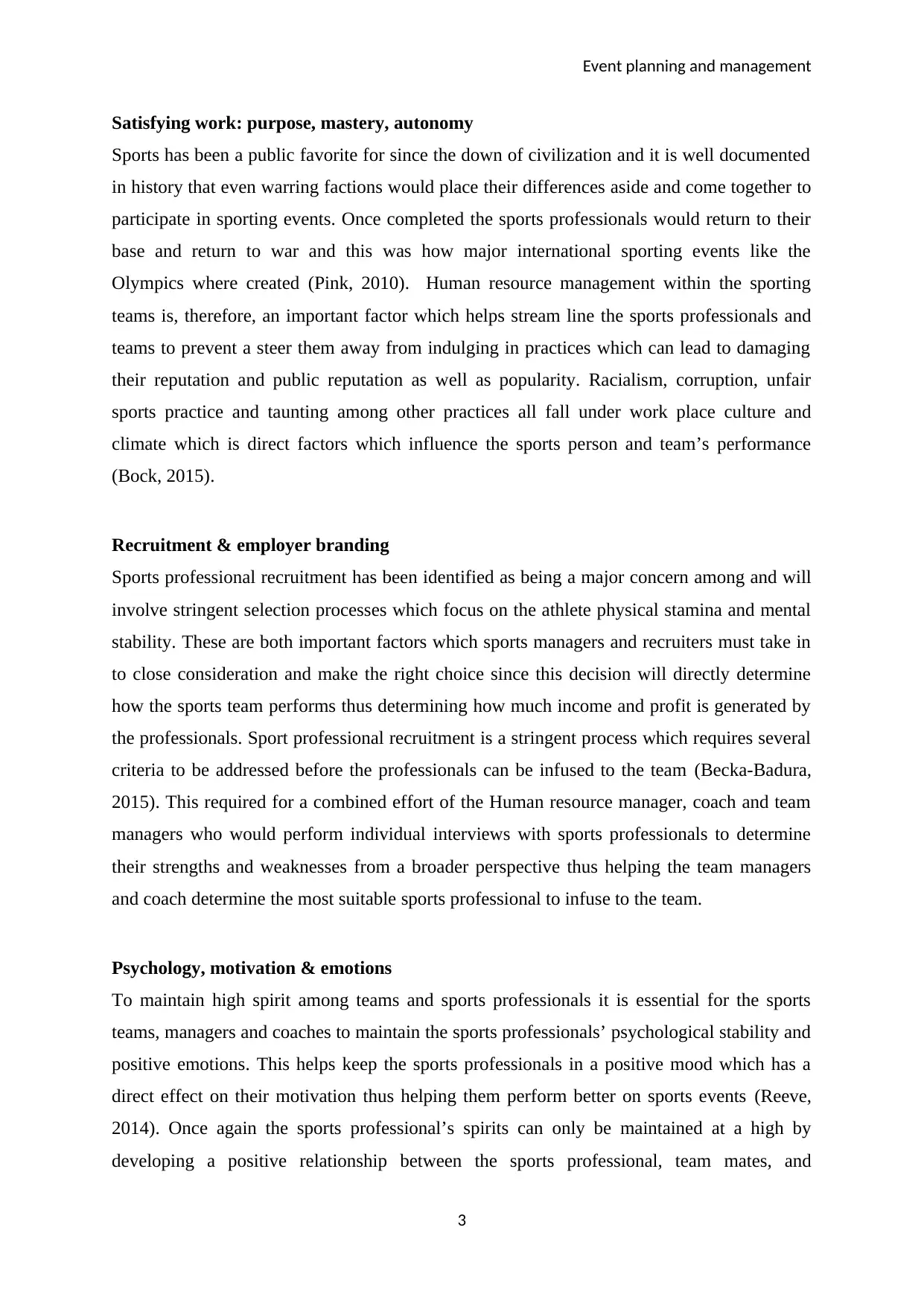
Event planning and management
Satisfying work: purpose, mastery, autonomy
Sports has been a public favorite for since the down of civilization and it is well documented
in history that even warring factions would place their differences aside and come together to
participate in sporting events. Once completed the sports professionals would return to their
base and return to war and this was how major international sporting events like the
Olympics where created (Pink, 2010). Human resource management within the sporting
teams is, therefore, an important factor which helps stream line the sports professionals and
teams to prevent a steer them away from indulging in practices which can lead to damaging
their reputation and public reputation as well as popularity. Racialism, corruption, unfair
sports practice and taunting among other practices all fall under work place culture and
climate which is direct factors which influence the sports person and team’s performance
(Bock, 2015).
Recruitment & employer branding
Sports professional recruitment has been identified as being a major concern among and will
involve stringent selection processes which focus on the athlete physical stamina and mental
stability. These are both important factors which sports managers and recruiters must take in
to close consideration and make the right choice since this decision will directly determine
how the sports team performs thus determining how much income and profit is generated by
the professionals. Sport professional recruitment is a stringent process which requires several
criteria to be addressed before the professionals can be infused to the team (Becka-Badura,
2015). This required for a combined effort of the Human resource manager, coach and team
managers who would perform individual interviews with sports professionals to determine
their strengths and weaknesses from a broader perspective thus helping the team managers
and coach determine the most suitable sports professional to infuse to the team.
Psychology, motivation & emotions
To maintain high spirit among teams and sports professionals it is essential for the sports
teams, managers and coaches to maintain the sports professionals’ psychological stability and
positive emotions. This helps keep the sports professionals in a positive mood which has a
direct effect on their motivation thus helping them perform better on sports events (Reeve,
2014). Once again the sports professional’s spirits can only be maintained at a high by
developing a positive relationship between the sports professional, team mates, and
3
Satisfying work: purpose, mastery, autonomy
Sports has been a public favorite for since the down of civilization and it is well documented
in history that even warring factions would place their differences aside and come together to
participate in sporting events. Once completed the sports professionals would return to their
base and return to war and this was how major international sporting events like the
Olympics where created (Pink, 2010). Human resource management within the sporting
teams is, therefore, an important factor which helps stream line the sports professionals and
teams to prevent a steer them away from indulging in practices which can lead to damaging
their reputation and public reputation as well as popularity. Racialism, corruption, unfair
sports practice and taunting among other practices all fall under work place culture and
climate which is direct factors which influence the sports person and team’s performance
(Bock, 2015).
Recruitment & employer branding
Sports professional recruitment has been identified as being a major concern among and will
involve stringent selection processes which focus on the athlete physical stamina and mental
stability. These are both important factors which sports managers and recruiters must take in
to close consideration and make the right choice since this decision will directly determine
how the sports team performs thus determining how much income and profit is generated by
the professionals. Sport professional recruitment is a stringent process which requires several
criteria to be addressed before the professionals can be infused to the team (Becka-Badura,
2015). This required for a combined effort of the Human resource manager, coach and team
managers who would perform individual interviews with sports professionals to determine
their strengths and weaknesses from a broader perspective thus helping the team managers
and coach determine the most suitable sports professional to infuse to the team.
Psychology, motivation & emotions
To maintain high spirit among teams and sports professionals it is essential for the sports
teams, managers and coaches to maintain the sports professionals’ psychological stability and
positive emotions. This helps keep the sports professionals in a positive mood which has a
direct effect on their motivation thus helping them perform better on sports events (Reeve,
2014). Once again the sports professional’s spirits can only be maintained at a high by
developing a positive relationship between the sports professional, team mates, and
3
Paraphrase This Document
Need a fresh take? Get an instant paraphrase of this document with our AI Paraphraser
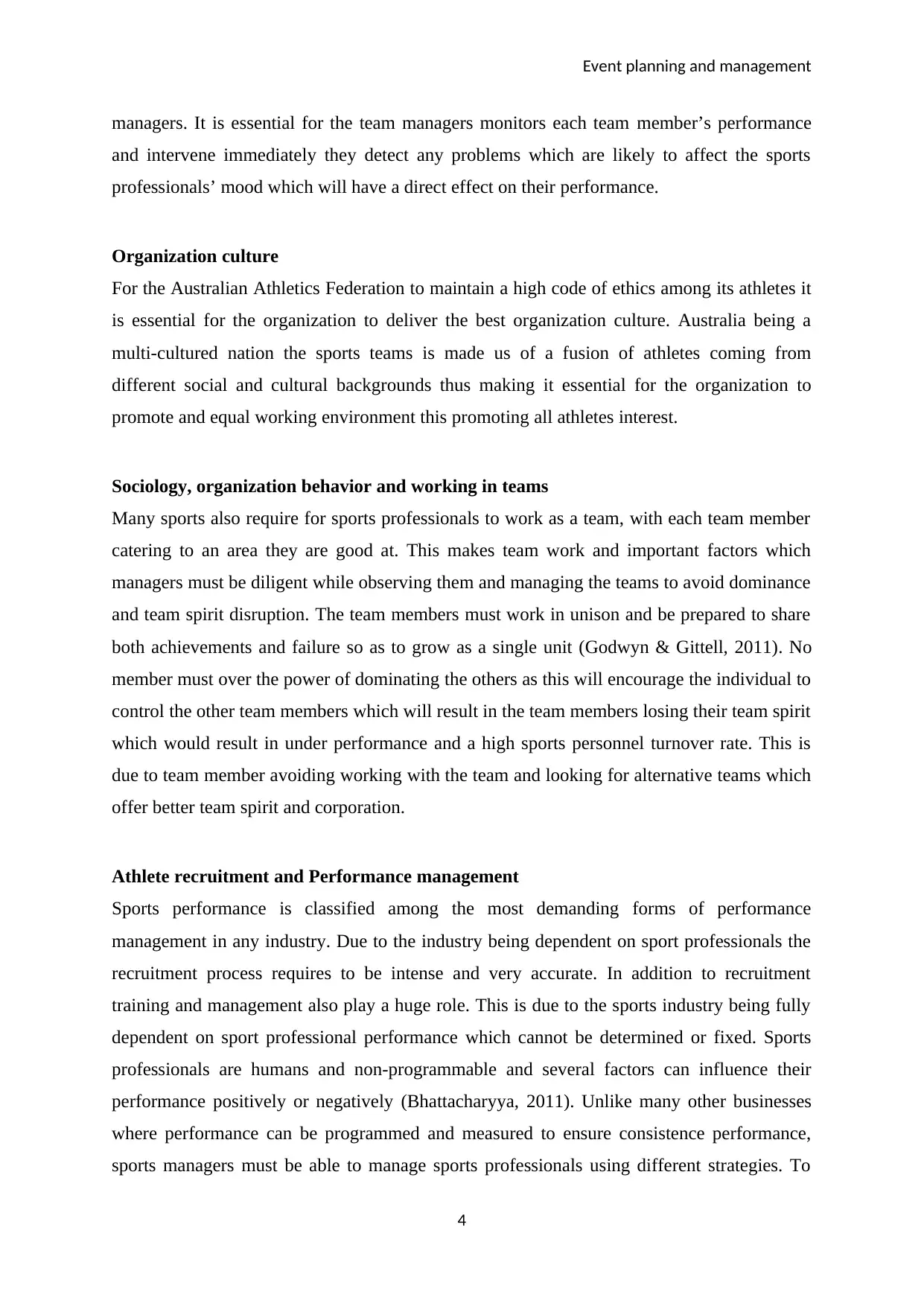
Event planning and management
managers. It is essential for the team managers monitors each team member’s performance
and intervene immediately they detect any problems which are likely to affect the sports
professionals’ mood which will have a direct effect on their performance.
Organization culture
For the Australian Athletics Federation to maintain a high code of ethics among its athletes it
is essential for the organization to deliver the best organization culture. Australia being a
multi-cultured nation the sports teams is made us of a fusion of athletes coming from
different social and cultural backgrounds thus making it essential for the organization to
promote and equal working environment this promoting all athletes interest.
Sociology, organization behavior and working in teams
Many sports also require for sports professionals to work as a team, with each team member
catering to an area they are good at. This makes team work and important factors which
managers must be diligent while observing them and managing the teams to avoid dominance
and team spirit disruption. The team members must work in unison and be prepared to share
both achievements and failure so as to grow as a single unit (Godwyn & Gittell, 2011). No
member must over the power of dominating the others as this will encourage the individual to
control the other team members which will result in the team members losing their team spirit
which would result in under performance and a high sports personnel turnover rate. This is
due to team member avoiding working with the team and looking for alternative teams which
offer better team spirit and corporation.
Athlete recruitment and Performance management
Sports performance is classified among the most demanding forms of performance
management in any industry. Due to the industry being dependent on sport professionals the
recruitment process requires to be intense and very accurate. In addition to recruitment
training and management also play a huge role. This is due to the sports industry being fully
dependent on sport professional performance which cannot be determined or fixed. Sports
professionals are humans and non-programmable and several factors can influence their
performance positively or negatively (Bhattacharyya, 2011). Unlike many other businesses
where performance can be programmed and measured to ensure consistence performance,
sports managers must be able to manage sports professionals using different strategies. To
4
managers. It is essential for the team managers monitors each team member’s performance
and intervene immediately they detect any problems which are likely to affect the sports
professionals’ mood which will have a direct effect on their performance.
Organization culture
For the Australian Athletics Federation to maintain a high code of ethics among its athletes it
is essential for the organization to deliver the best organization culture. Australia being a
multi-cultured nation the sports teams is made us of a fusion of athletes coming from
different social and cultural backgrounds thus making it essential for the organization to
promote and equal working environment this promoting all athletes interest.
Sociology, organization behavior and working in teams
Many sports also require for sports professionals to work as a team, with each team member
catering to an area they are good at. This makes team work and important factors which
managers must be diligent while observing them and managing the teams to avoid dominance
and team spirit disruption. The team members must work in unison and be prepared to share
both achievements and failure so as to grow as a single unit (Godwyn & Gittell, 2011). No
member must over the power of dominating the others as this will encourage the individual to
control the other team members which will result in the team members losing their team spirit
which would result in under performance and a high sports personnel turnover rate. This is
due to team member avoiding working with the team and looking for alternative teams which
offer better team spirit and corporation.
Athlete recruitment and Performance management
Sports performance is classified among the most demanding forms of performance
management in any industry. Due to the industry being dependent on sport professionals the
recruitment process requires to be intense and very accurate. In addition to recruitment
training and management also play a huge role. This is due to the sports industry being fully
dependent on sport professional performance which cannot be determined or fixed. Sports
professionals are humans and non-programmable and several factors can influence their
performance positively or negatively (Bhattacharyya, 2011). Unlike many other businesses
where performance can be programmed and measured to ensure consistence performance,
sports managers must be able to manage sports professionals using different strategies. To
4
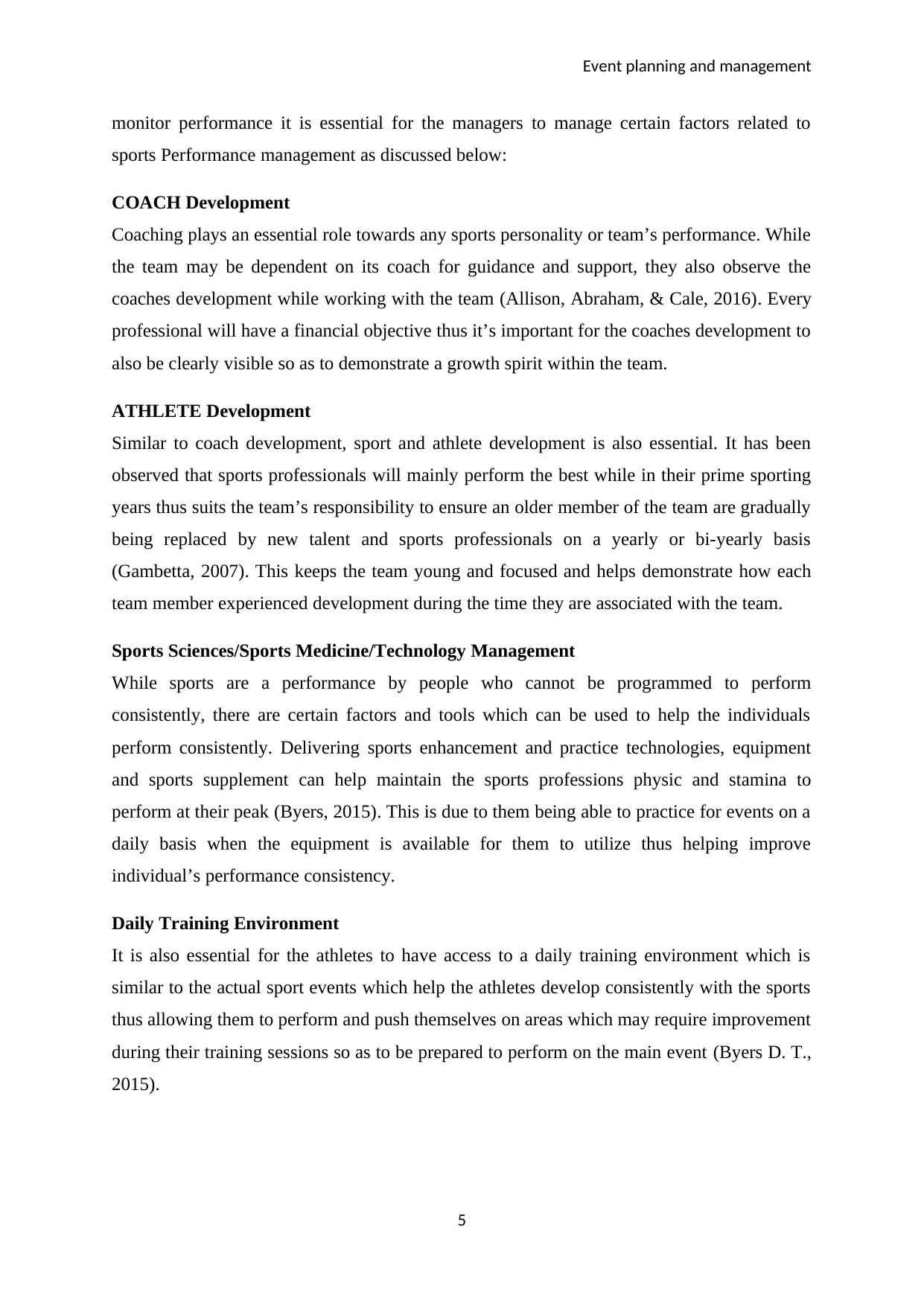
Event planning and management
monitor performance it is essential for the managers to manage certain factors related to
sports Performance management as discussed below:
COACH Development
Coaching plays an essential role towards any sports personality or team’s performance. While
the team may be dependent on its coach for guidance and support, they also observe the
coaches development while working with the team (Allison, Abraham, & Cale, 2016). Every
professional will have a financial objective thus it’s important for the coaches development to
also be clearly visible so as to demonstrate a growth spirit within the team.
ATHLETE Development
Similar to coach development, sport and athlete development is also essential. It has been
observed that sports professionals will mainly perform the best while in their prime sporting
years thus suits the team’s responsibility to ensure an older member of the team are gradually
being replaced by new talent and sports professionals on a yearly or bi-yearly basis
(Gambetta, 2007). This keeps the team young and focused and helps demonstrate how each
team member experienced development during the time they are associated with the team.
Sports Sciences/Sports Medicine/Technology Management
While sports are a performance by people who cannot be programmed to perform
consistently, there are certain factors and tools which can be used to help the individuals
perform consistently. Delivering sports enhancement and practice technologies, equipment
and sports supplement can help maintain the sports professions physic and stamina to
perform at their peak (Byers, 2015). This is due to them being able to practice for events on a
daily basis when the equipment is available for them to utilize thus helping improve
individual’s performance consistency.
Daily Training Environment
It is also essential for the athletes to have access to a daily training environment which is
similar to the actual sport events which help the athletes develop consistently with the sports
thus allowing them to perform and push themselves on areas which may require improvement
during their training sessions so as to be prepared to perform on the main event (Byers D. T.,
2015).
5
monitor performance it is essential for the managers to manage certain factors related to
sports Performance management as discussed below:
COACH Development
Coaching plays an essential role towards any sports personality or team’s performance. While
the team may be dependent on its coach for guidance and support, they also observe the
coaches development while working with the team (Allison, Abraham, & Cale, 2016). Every
professional will have a financial objective thus it’s important for the coaches development to
also be clearly visible so as to demonstrate a growth spirit within the team.
ATHLETE Development
Similar to coach development, sport and athlete development is also essential. It has been
observed that sports professionals will mainly perform the best while in their prime sporting
years thus suits the team’s responsibility to ensure an older member of the team are gradually
being replaced by new talent and sports professionals on a yearly or bi-yearly basis
(Gambetta, 2007). This keeps the team young and focused and helps demonstrate how each
team member experienced development during the time they are associated with the team.
Sports Sciences/Sports Medicine/Technology Management
While sports are a performance by people who cannot be programmed to perform
consistently, there are certain factors and tools which can be used to help the individuals
perform consistently. Delivering sports enhancement and practice technologies, equipment
and sports supplement can help maintain the sports professions physic and stamina to
perform at their peak (Byers, 2015). This is due to them being able to practice for events on a
daily basis when the equipment is available for them to utilize thus helping improve
individual’s performance consistency.
Daily Training Environment
It is also essential for the athletes to have access to a daily training environment which is
similar to the actual sport events which help the athletes develop consistently with the sports
thus allowing them to perform and push themselves on areas which may require improvement
during their training sessions so as to be prepared to perform on the main event (Byers D. T.,
2015).
5
⊘ This is a preview!⊘
Do you want full access?
Subscribe today to unlock all pages.

Trusted by 1+ million students worldwide
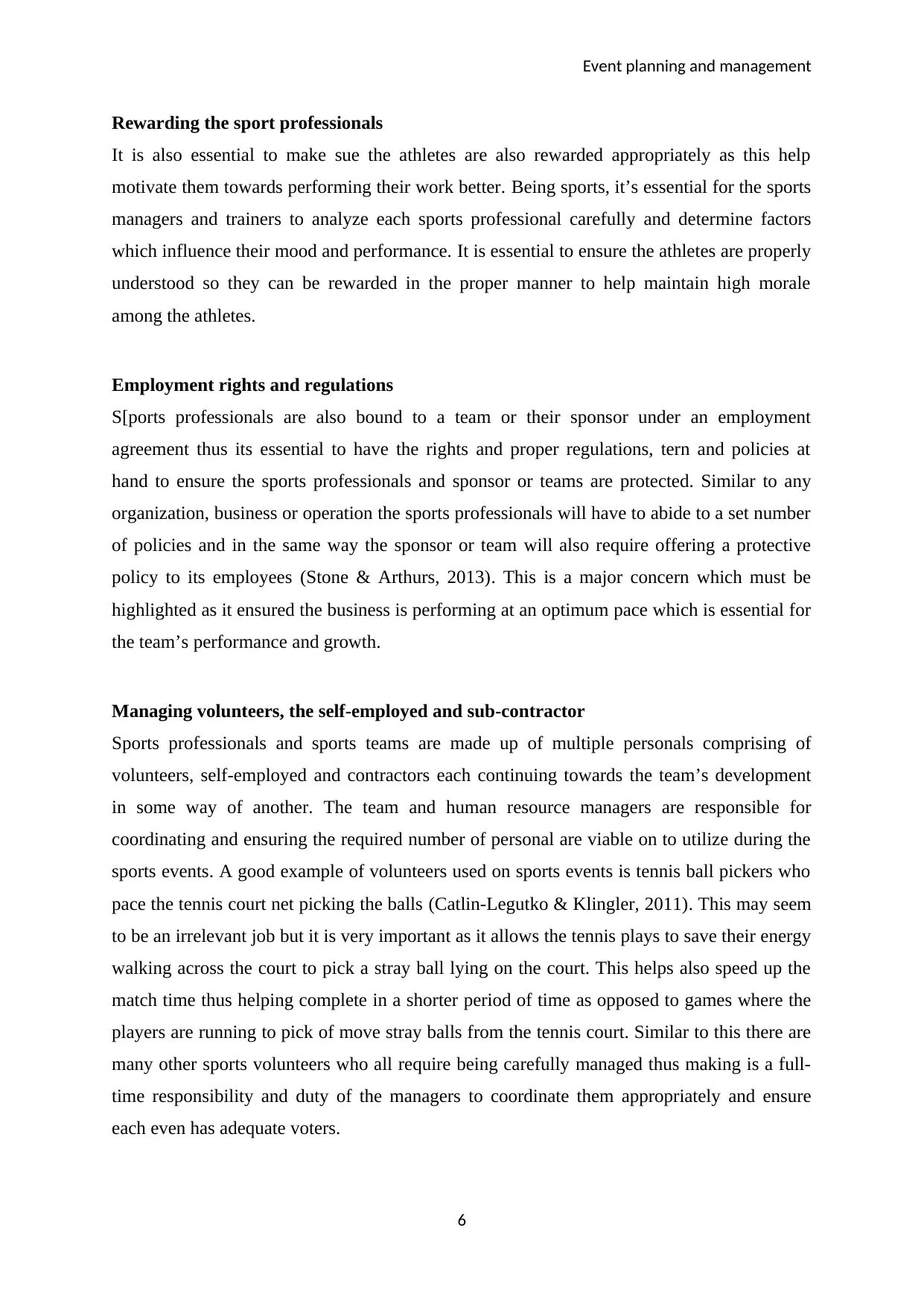
Event planning and management
Rewarding the sport professionals
It is also essential to make sue the athletes are also rewarded appropriately as this help
motivate them towards performing their work better. Being sports, it’s essential for the sports
managers and trainers to analyze each sports professional carefully and determine factors
which influence their mood and performance. It is essential to ensure the athletes are properly
understood so they can be rewarded in the proper manner to help maintain high morale
among the athletes.
Employment rights and regulations
S[ports professionals are also bound to a team or their sponsor under an employment
agreement thus its essential to have the rights and proper regulations, tern and policies at
hand to ensure the sports professionals and sponsor or teams are protected. Similar to any
organization, business or operation the sports professionals will have to abide to a set number
of policies and in the same way the sponsor or team will also require offering a protective
policy to its employees (Stone & Arthurs, 2013). This is a major concern which must be
highlighted as it ensured the business is performing at an optimum pace which is essential for
the team’s performance and growth.
Managing volunteers, the self-employed and sub-contractor
Sports professionals and sports teams are made up of multiple personals comprising of
volunteers, self-employed and contractors each continuing towards the team’s development
in some way of another. The team and human resource managers are responsible for
coordinating and ensuring the required number of personal are viable on to utilize during the
sports events. A good example of volunteers used on sports events is tennis ball pickers who
pace the tennis court net picking the balls (Catlin-Legutko & Klingler, 2011). This may seem
to be an irrelevant job but it is very important as it allows the tennis plays to save their energy
walking across the court to pick a stray ball lying on the court. This helps also speed up the
match time thus helping complete in a shorter period of time as opposed to games where the
players are running to pick of move stray balls from the tennis court. Similar to this there are
many other sports volunteers who all require being carefully managed thus making is a full-
time responsibility and duty of the managers to coordinate them appropriately and ensure
each even has adequate voters.
6
Rewarding the sport professionals
It is also essential to make sue the athletes are also rewarded appropriately as this help
motivate them towards performing their work better. Being sports, it’s essential for the sports
managers and trainers to analyze each sports professional carefully and determine factors
which influence their mood and performance. It is essential to ensure the athletes are properly
understood so they can be rewarded in the proper manner to help maintain high morale
among the athletes.
Employment rights and regulations
S[ports professionals are also bound to a team or their sponsor under an employment
agreement thus its essential to have the rights and proper regulations, tern and policies at
hand to ensure the sports professionals and sponsor or teams are protected. Similar to any
organization, business or operation the sports professionals will have to abide to a set number
of policies and in the same way the sponsor or team will also require offering a protective
policy to its employees (Stone & Arthurs, 2013). This is a major concern which must be
highlighted as it ensured the business is performing at an optimum pace which is essential for
the team’s performance and growth.
Managing volunteers, the self-employed and sub-contractor
Sports professionals and sports teams are made up of multiple personals comprising of
volunteers, self-employed and contractors each continuing towards the team’s development
in some way of another. The team and human resource managers are responsible for
coordinating and ensuring the required number of personal are viable on to utilize during the
sports events. A good example of volunteers used on sports events is tennis ball pickers who
pace the tennis court net picking the balls (Catlin-Legutko & Klingler, 2011). This may seem
to be an irrelevant job but it is very important as it allows the tennis plays to save their energy
walking across the court to pick a stray ball lying on the court. This helps also speed up the
match time thus helping complete in a shorter period of time as opposed to games where the
players are running to pick of move stray balls from the tennis court. Similar to this there are
many other sports volunteers who all require being carefully managed thus making is a full-
time responsibility and duty of the managers to coordinate them appropriately and ensure
each even has adequate voters.
6
Paraphrase This Document
Need a fresh take? Get an instant paraphrase of this document with our AI Paraphraser
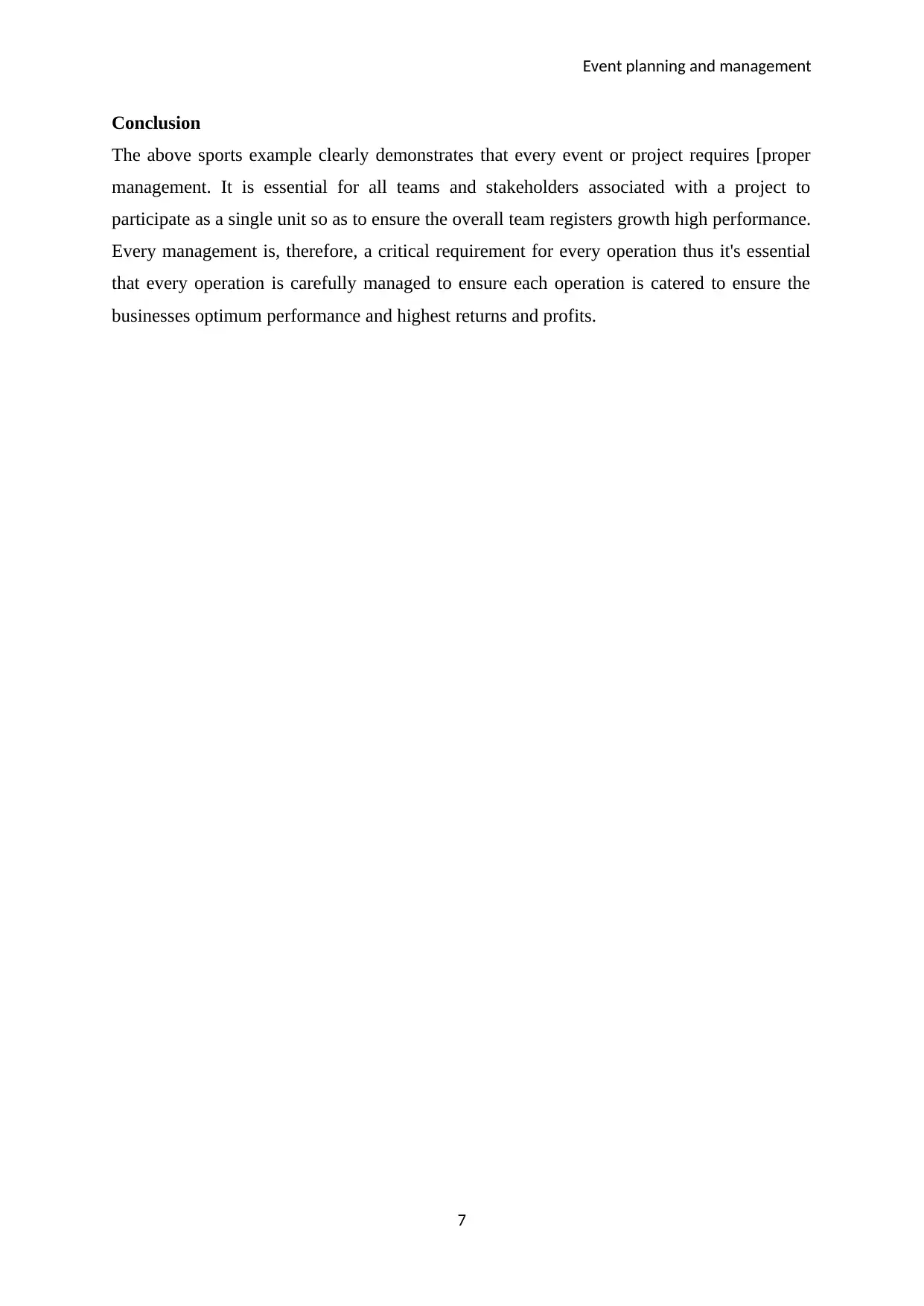
Event planning and management
Conclusion
The above sports example clearly demonstrates that every event or project requires [proper
management. It is essential for all teams and stakeholders associated with a project to
participate as a single unit so as to ensure the overall team registers growth high performance.
Every management is, therefore, a critical requirement for every operation thus it's essential
that every operation is carefully managed to ensure each operation is catered to ensure the
businesses optimum performance and highest returns and profits.
7
Conclusion
The above sports example clearly demonstrates that every event or project requires [proper
management. It is essential for all teams and stakeholders associated with a project to
participate as a single unit so as to ensure the overall team registers growth high performance.
Every management is, therefore, a critical requirement for every operation thus it's essential
that every operation is carefully managed to ensure each operation is catered to ensure the
businesses optimum performance and highest returns and profits.
7
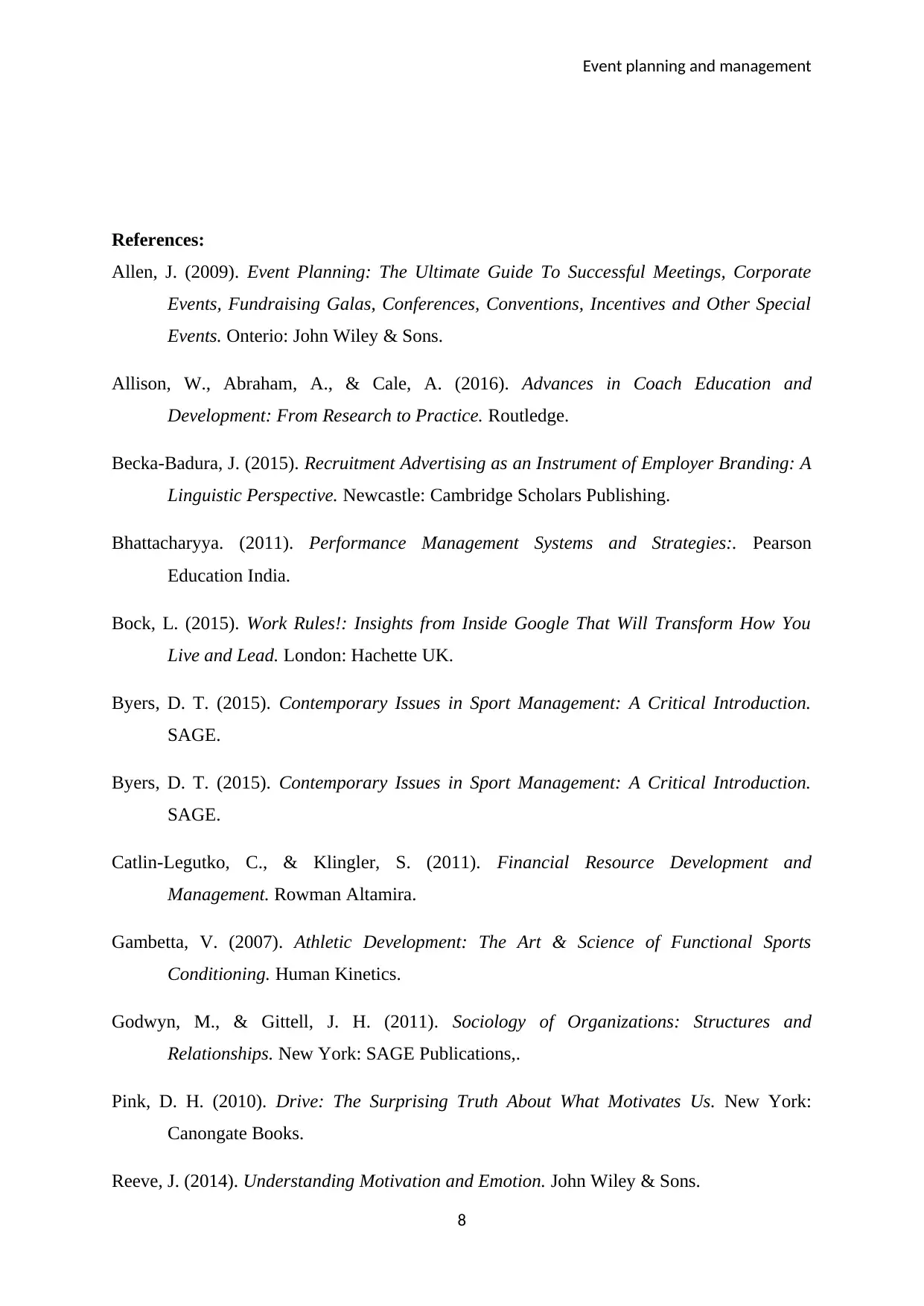
Event planning and management
References:
Allen, J. (2009). Event Planning: The Ultimate Guide To Successful Meetings, Corporate
Events, Fundraising Galas, Conferences, Conventions, Incentives and Other Special
Events. Onterio: John Wiley & Sons.
Allison, W., Abraham, A., & Cale, A. (2016). Advances in Coach Education and
Development: From Research to Practice. Routledge.
Becka-Badura, J. (2015). Recruitment Advertising as an Instrument of Employer Branding: A
Linguistic Perspective. Newcastle: Cambridge Scholars Publishing.
Bhattacharyya. (2011). Performance Management Systems and Strategies:. Pearson
Education India.
Bock, L. (2015). Work Rules!: Insights from Inside Google That Will Transform How You
Live and Lead. London: Hachette UK.
Byers, D. T. (2015). Contemporary Issues in Sport Management: A Critical Introduction.
SAGE.
Byers, D. T. (2015). Contemporary Issues in Sport Management: A Critical Introduction.
SAGE.
Catlin-Legutko, C., & Klingler, S. (2011). Financial Resource Development and
Management. Rowman Altamira.
Gambetta, V. (2007). Athletic Development: The Art & Science of Functional Sports
Conditioning. Human Kinetics.
Godwyn, M., & Gittell, J. H. (2011). Sociology of Organizations: Structures and
Relationships. New York: SAGE Publications,.
Pink, D. H. (2010). Drive: The Surprising Truth About What Motivates Us. New York:
Canongate Books.
Reeve, J. (2014). Understanding Motivation and Emotion. John Wiley & Sons.
8
References:
Allen, J. (2009). Event Planning: The Ultimate Guide To Successful Meetings, Corporate
Events, Fundraising Galas, Conferences, Conventions, Incentives and Other Special
Events. Onterio: John Wiley & Sons.
Allison, W., Abraham, A., & Cale, A. (2016). Advances in Coach Education and
Development: From Research to Practice. Routledge.
Becka-Badura, J. (2015). Recruitment Advertising as an Instrument of Employer Branding: A
Linguistic Perspective. Newcastle: Cambridge Scholars Publishing.
Bhattacharyya. (2011). Performance Management Systems and Strategies:. Pearson
Education India.
Bock, L. (2015). Work Rules!: Insights from Inside Google That Will Transform How You
Live and Lead. London: Hachette UK.
Byers, D. T. (2015). Contemporary Issues in Sport Management: A Critical Introduction.
SAGE.
Byers, D. T. (2015). Contemporary Issues in Sport Management: A Critical Introduction.
SAGE.
Catlin-Legutko, C., & Klingler, S. (2011). Financial Resource Development and
Management. Rowman Altamira.
Gambetta, V. (2007). Athletic Development: The Art & Science of Functional Sports
Conditioning. Human Kinetics.
Godwyn, M., & Gittell, J. H. (2011). Sociology of Organizations: Structures and
Relationships. New York: SAGE Publications,.
Pink, D. H. (2010). Drive: The Surprising Truth About What Motivates Us. New York:
Canongate Books.
Reeve, J. (2014). Understanding Motivation and Emotion. John Wiley & Sons.
8
⊘ This is a preview!⊘
Do you want full access?
Subscribe today to unlock all pages.

Trusted by 1+ million students worldwide
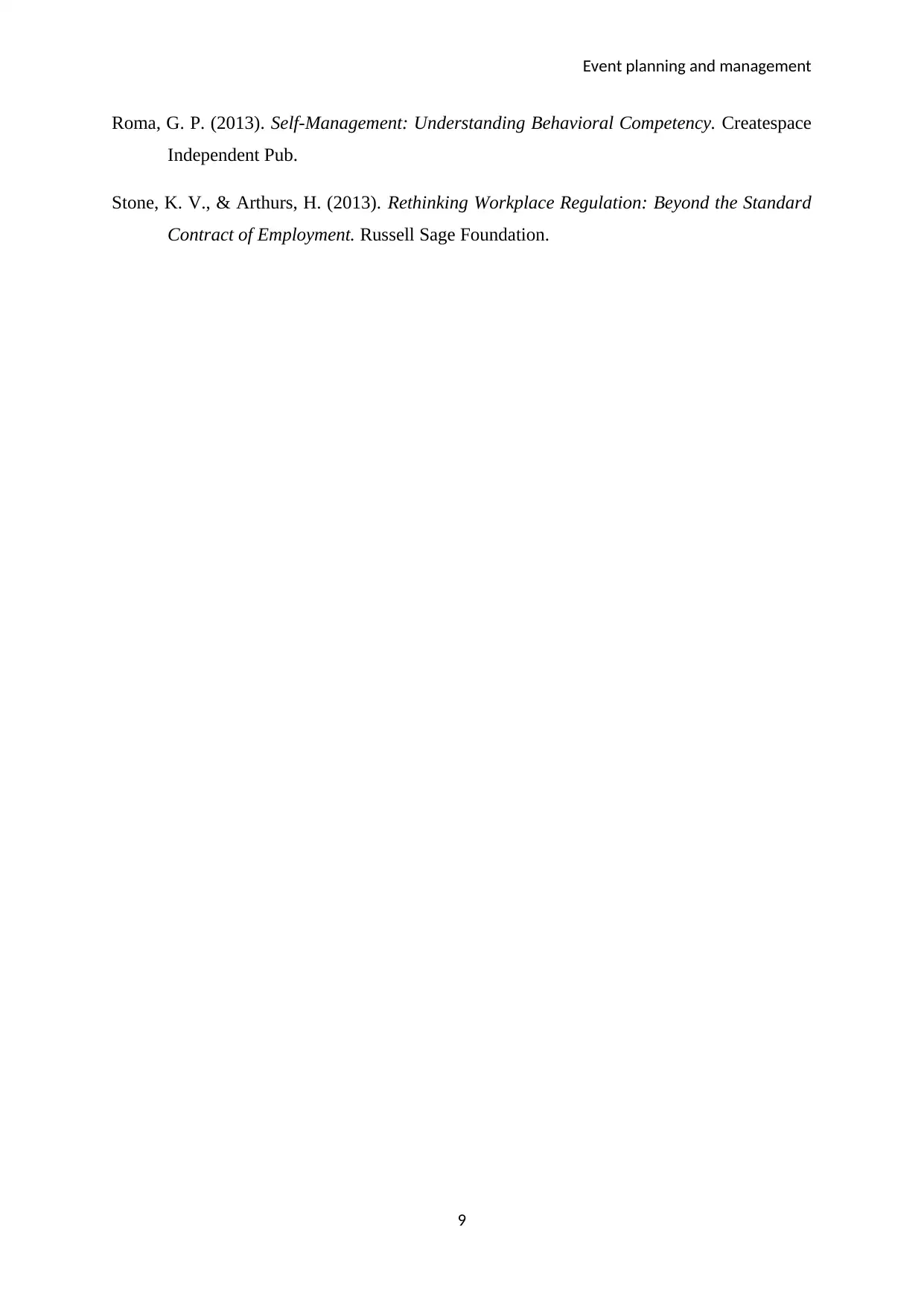
Event planning and management
Roma, G. P. (2013). Self-Management: Understanding Behavioral Competency. Createspace
Independent Pub.
Stone, K. V., & Arthurs, H. (2013). Rethinking Workplace Regulation: Beyond the Standard
Contract of Employment. Russell Sage Foundation.
9
Roma, G. P. (2013). Self-Management: Understanding Behavioral Competency. Createspace
Independent Pub.
Stone, K. V., & Arthurs, H. (2013). Rethinking Workplace Regulation: Beyond the Standard
Contract of Employment. Russell Sage Foundation.
9
1 out of 10
Your All-in-One AI-Powered Toolkit for Academic Success.
+13062052269
info@desklib.com
Available 24*7 on WhatsApp / Email
![[object Object]](/_next/static/media/star-bottom.7253800d.svg)
Unlock your academic potential
Copyright © 2020–2026 A2Z Services. All Rights Reserved. Developed and managed by ZUCOL.

